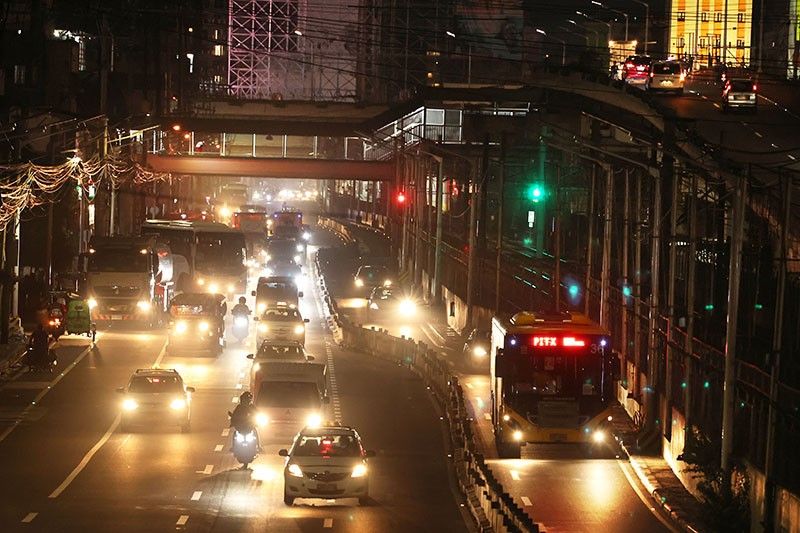Petitioners vs NCAP grilled over direct resort to Supreme Court

MANILA, Philippines — As the Supreme Court starts hearing the pleas challenging the enforcement of the "No Contact Apprehension Policy" on motorists, petitioners are asked to defend their direct resort to the Supreme Court, which is the court of last resort.
Solicitor General Menardo Guevarra, in his opening statement, told the SC that the petitioners in the case do not have locus standi (place to stand), a requirement “not be lightly trifled with.”
“Locus standi demands that those who petition relief from this Court establish not only a right but also a clear actual or threatened injury arising from the violation of such right,” he said.
Guevarra represented the Metropolitan Manila Development Authority and the Land Transportation Office, but he also delivered the opening statement on behalf of the local government units of Manila, Quezon City, Valenzuela, Muntinlupa and Parañaque tagged as respondent.
READ: Mayors firm on continuing no-contact apprehension despite opposition at LTO, SC
The SC on Tuesday heard the three petitions challenging the constitutionality of the implementation of NCAP filed by transport groups, a lawyer who was fined P20,000 for alleged traffic violations and taxi operators. Only Associate Justice Japar Dimaampao was able to interpellate the petitioners during the time allocated for the day.
Guevarra argued that the transport operators failed to allege any actual injury traceable to the implementation of the NCAP, while the claimed injury of lawyer Juman Paa — the second petitioner — came from his own violation of traffic rules.
He stressed: “Petitioners’ lack of locus standi cannot be cured by an erroneous invocation of the rule on third party standing.”
The solicitor general also said that a facial challenge—a petition filed against a statute for being unconstitutional “on its face”—is only allowed when the right to speech is implicated, which is not the case at hand.
GIOS-Samar v. DOTC
Associate Justice Dimaampao started his interpellation of the petitioners with question on the landmark case GIOS-Samar v. DOTC.
In the said ruling, written by now retired Associate Justice Francis Jardeleza, discussed the doctrine of hierarchy of courts. It read partly: “That hierarchy is determinative of the venue of appeals, and should also serve as a general determinant of the appropriate forum for petitioners for the extraordinary writs.”
Lawyer Paa admitted that he has not read the case entirely. He, however, cited transcendental importance in their resort to the SC. Paa argued that their case also involves public money.
Dimaampao pressed: “What constitutional provision can you cite to support your petition in taking direct recourse” to the SC?
Paa responded: “It is within the regional and concurrent jurisdiction with Regional Trial Court, Court of Appeals and SC to declare unconstitutionality of a particular issue. No violation of hierarchy of courts.”
He added that time is of the essence in the case as a temporary restraining order issued by the RTC will only last up to 20 days while a TRO from the SC will remain effective until lifted.
The SC issued a TRO on the implementation of NCAP on August 30.
NCAP as solution to worsening traffic situation
Other issues that petitioners raised is that the NCAP punishes registered owners and not the drivers who allegedly made the traffic violation, and that violations caught through NCAP collect higher fines than those apprehended by local enforcers.
Meanwhile, Solicitor General Guevarra cited the worsening traffic situation in the country in defending the NCAP.
He noted that Metro Manila’s road network continues to expand over the years, while the average travel speed dropped to 23.38 kilometers per hour in 2019, from P32.86 kilometers per hour in 2013.
Guevarra also cited estimated economic losses due to traffic congestion in roads — which can be traced to ballooning number of vehicles on the road — of the capital region that reach up to billions per day.
Meanwhile, the LTO recorded a 127%-increase in NCR vehicle registration in over 20 years, while traffic violations continue to increase exponentially: In 2019, traffic apprehensions reached 250,767, from 162,364 in 2002.
“These statistics underscore the need for innovative solutions to our ever-worsening traffic situation. The NCAP is one such solution,” Guevarra added.
“We therefore pray that this Most Honorable Court greenlight the NCAP’s re[1]implementation, especially at this point when government has embarked on the difficult task of reinvigorating our economy devastated by the pandemic,” he also said in his opening statement.
Justice Dimaampao will proceed with his interpellation of Guevarra in the next setting on Jan. 24, 2023 at 2:00 p.m.
- Latest
- Trending































